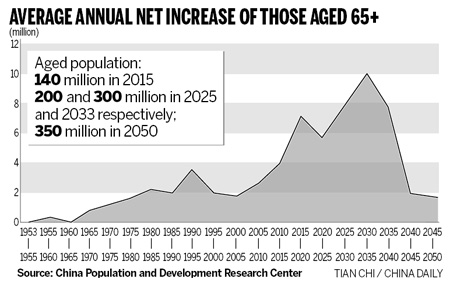Society
One in four Chinese 'aged above 65 by 2050'
By Xin Dingding (China Daily)
Updated: 2010-05-20 07:07
 |
Large Medium Small |

BEIJING - Nearly one out of every four people in the country will be older than 65 by the year 2050, demographers have forecast.
The country's population, currently 1.33 billion, will also not exceed 1.5 billion, Jiang Weiping, director-general of the China Population and Development Research Center, told a population forum on Wednesday.
The population will peak around the year 2040 at about 1.47 billion people before starting to decline, he said, citing a forecast from the center's population administration decision information system.
| ||||
The country's family planning policies have helped prevent 400 million births in the past three decades, according to statistics.
The country's current fertility rate is 1.8, which means every woman giving birth to 1.8 children. That rate is ideal, said Hania Zlotnik, director of the population division of the United Nations Secretariat.
A fertility rate lower than 1.5 or higher than 2.3 will be problematic, she said.
However, the aging trend is irreversible in China, as by 2050, 350 million out of the total 1.45 billion Chinese people will be aged over 65, Jiang said.
About 180 million people were older than 60 by last year, earlier population reports said.
China will see two peaks in its aging population - a net growth of 7 million annually between 2015-2020 and 10 million annually between 2030-2035.
"More families of old couples living by themselves, or a single elderly person living alone, will appear by then. The changes in family size, structure and living arrangement will impact many things, including consumption structure and the elder-age security system," Jiang said.
Aging has been regarded as a problem for many countries, as researchers worry it can lead to labor shortage, lower productivity and skyrocketing medical expenses, said Wu Cangping, a professor with Renmin University of China.
Still, China will not be short of workers. The labor supply will peak at 1 billion around 2015 and remain above 850 million before 2050, Jiang Weiping said.
Ma Li, a counselor to China's Cabinet on population issues, said on Tuesday that the country can still enjoy 25 more years of "demographic dividend".
The "demographic dividend" has been considered an important contributor to China's remarkable economic progress.
Over the past decades, China enjoyed a productive population age structure, with working-age people making up a large part of its population, and retired and pre-working-age people making up a relatively small fraction of it.
The productive population age structure, characterized by abundant labor and a high savings ratio, proved to be a dynamic source of economic growth for China and consequently took the country into a long "golden period" of economic and social development, analysts said.


